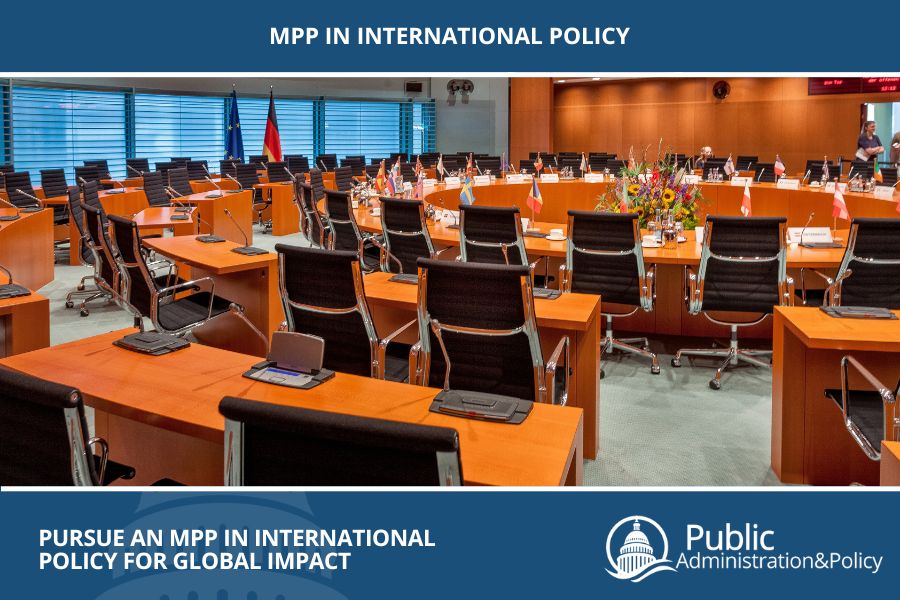MPP in International Policy
Addressing Global Challenges Through Public Policy
A Master of Public Policy (MPP) in International Policy equips students with the skills and knowledge to address global challenges through effective policymaking, research, and analysis. This degree program is ideal for individuals passionate about solving complex international development, diplomacy, trade, and global governance issues.
Students in this program gain a strong foundation in policy analysis, quantitative skills, and program evaluation, enabling them to design solutions for pressing international issues such as climate change, public health crises, and economic inequality. With an interdisciplinary approach rooted in the social sciences, the program provides the tools to address global challenges while preparing for impactful careers in international organizations, government agencies, and the public and private sectors.

Table of Contents
Who Should Pursue a Master of Public Policy in International Policy?
A Master of Public Policy in International Policy is designed for students and professionals eager to influence global affairs and contribute to sustainable development. Ideal candidates include:
- Aspiring Diplomats: Individuals seeking careers in foreign service or international relations.
- Global Advocates: Professionals committed to addressing humanitarian crises, health issues, or environmental sustainability.
- Policy Policy AnalystAnalysts: Those aiming to research and evaluate global policies to create evidence-based solutions.
- Private Sector Leaders: Individuals working in multinational corporations who want to address regulatory challenges and corporate social responsibility.
Pros and Cons of an MPP in International Policy
| Pros | Cons |
|---|---|
| Provides specialized knowledge in global governance and international trade. | Requires a strong understanding of cross-cultural dynamics and languages. |
| Opens career opportunities in international organizations and government agencies. | Limited focus on U.S.-specific policies, which may narrow domestic career options. |
| Builds expertise in international development and global problem-solving. | It may require travel or relocation for specific career paths. |
This program is ideal for individuals passionate about solving 21st-century global challenges and shaping policies that foster international cooperation.
Admissions Requirements
To apply for a Master of Public Policy in International Policy, most programs require:
- Bachelor’s Degree: From an accredited institution, preferably in international relations, social sciences, political science, or economics.
- GPA Requirements: A minimum GPA of 3.0 is typically required, though competitive programs may prefer higher.
- Letters of Recommendation: Two to three references from academic or professional contacts who can attest to your qualifications.
- Personal Statement: A written explanation of your interest in international policy and career goals.
- Résumé or CV: Highlighting relevant academic achievements and professional experience.
- Financial Aid Applications: Students should complete the FAFSA and explore scholarships or assistantships available for international policy studies.
Some programs may waive GRE requirements, particularly for applicants with significant professional experience. Faculty members often assess leadership potential, analytical skills, and a commitment to global affairs.
Online MPP in International Policy Curriculum
The curriculum for an MPP in International Policy combines core public policy courses with specialized electives and hands-on projects. Most programs require 36–48 credit hours, including a capstone project, thesis, or joint degree option such as pairing the MPP with a Master of Arts in a complementary field like international relations.
Core Courses
Students develop foundational knowledge in public policy through courses such as:
- Foundations of Public Policy and Governance
- International Economics and Trade Policy
- Ethics in Global Governance
- Quantitative Methods for International Policy Analysis
- Program Evaluation in International Development
Elective Courses
Elective options allow students to explore topics such as:
- Global Environmental Policy and Sustainability
- Public Health Challenges in Developing Nations
- International Security and Conflict Resolution
- Migration and Refugee Policy
- Science, Technology, and Innovation in Global Development
Capstone Project
Most programs culminate in a capstone project, where degree students apply their learning to real-world international policy challenges. Examples include:
- Designing policies to address climate change in developing nations.
- Evaluating the impact of international aid programs on poverty reduction.
- Developing strategies to improve global health outcomes through public-private partnerships.
What Careers Can You Pursue with an MPP in International Policy?
An MPP in International Policy prepares graduates for leadership roles in diverse global settings. Common career paths include:
- Policy Advisor: Works with international organizations to develop and implement effective global policies.
- Foreign Service Officer: Represents government interests abroad through diplomacy and advocacy.
- Program Manager: Oversees international aid programs for nonprofits or multilateral organizations.
- Trade Policy Analyst: Analyzes and develops international trade and economics strategies.
- Humanitarian Affairs Specialist: Coordinates responses to global crises, such as natural disasters or conflicts.
These roles require strong quantitative skills, knowledge of global governance systems, and the ability to collaborate across cultures and sectors.
Why Choose an MPP in International Policy?
The Master of Public Policy in International Policy offers a unique opportunity to shape policies that address global challenges and improve international cooperation.
Key Benefits
- Global Perspective: Gain the tools to analyze and address international challenges such as economic inequality, climate change, and migration.
- Diverse Career Opportunities: Graduates can work in the public and private sectors, nonprofits, or multilateral organizations.
- Practical Skill Development: Coursework emphasizes program evaluation, policy analysis, and strategic decision-making.
- Networking Opportunities: Build connections with global leaders, policymakers, and experts in international affairs.
- Joint Degree Options: Some programs allow students to earn a Master of Arts in international relations in addition to their MPP.
This degree, which emphasizes tackling global issues in the 21st century, is a pathway to a meaningful and impactful career in public policy.
Sources
- NASPAA. “Accreditation Standards for Public Policy Programs.” https://www.naspaa.org
- U.S. News & World Report. “Best Online MPP Programs.” https://www.usnews.com
- Bureau of Labor Statistics (BLS). “Occupational Outlook Handbook: Public Policy Careers.” https://www.bls.gov
Acknowledgment
This guide provides an overview of the MPP in International Policy, offering insights into the curriculum, admissions requirements, and career opportunities for students interested in global policymaking.